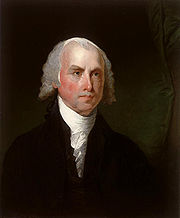
Federalist No. 63
Encyclopedia

James Madison
James Madison, Jr. was an American statesman and political theorist. He was the fourth President of the United States and is hailed as the “Father of the Constitution” for being the primary author of the United States Constitution and at first an opponent of, and then a key author of the United...
, the sixty-third of the Federalist Papers
Federalist Papers
The Federalist Papers are a series of 85 articles or essays promoting the ratification of the United States Constitution. Seventy-seven of the essays were published serially in The Independent Journal and The New York Packet between October 1787 and August 1788...
. It was published on March 1, 1788 under the pseudonym
Pseudonym
A pseudonym is a name that a person assumes for a particular purpose and that differs from his or her original orthonym...
Publius, the name under which all the Federalist Papers were published. Continuing what Madison began in Federalist No. 62
Federalist No. 62
Federalist No. 62 is an essay by James Madison, the sixty-second of the Federalist Papers. It was published on February 27, 1788 under the pseudonym Publius, the name under which all the Federalist Papers were published. This is the first of two essays by Madison detailing, and seeking to justify,...
, it is the second of two essays detailing and justifying the organization of the United States Senate
United States Senate
The United States Senate is the upper house of the bicameral legislature of the United States, and together with the United States House of Representatives comprises the United States Congress. The composition and powers of the Senate are established in Article One of the U.S. Constitution. Each...
. No. 63 is titled, "The Senate Continued." This essay is the last of Madison's contributions to the series.
In this paper, Madison lays out more reasons for the necessity of the Senate. He argues that the Senate, a strong and the most stable member of the government, is needed to ensure lasting relations with foreign nations. He also notes that because Senators are elected to six-year terms, they will have sufficient time to be responsible for their actions. The Senate can also serve as a check on the people since, although during most times their will is just, they too are "subject to the [periodic] infection of violent passions."
Madison also gives examples of past long-lived republics, all of which had a Senate. They, however, had senates elected for life, which, if followed, could threaten the liberty of the people. It is for this reason why the Senate proposed in the constitution has six-year terms. In this way, the Senate in the Union blends stability with the idea of liberty.

